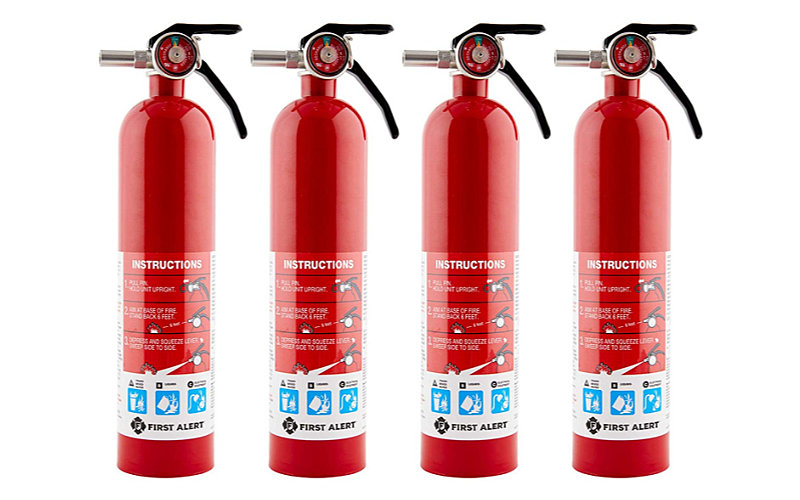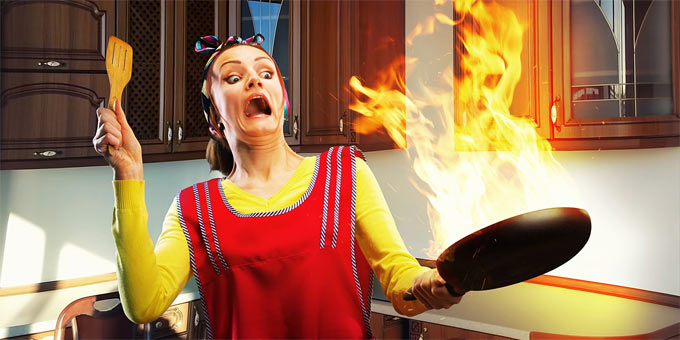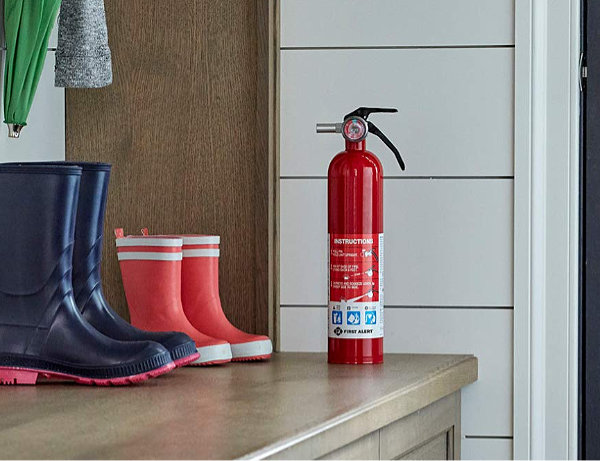Fire Extinguishers For Home Preparedness

Fire extinguishers for your home. I certainly hope that you have at least one fire extinguisher in your home for preparedness! If you’re reading this, and you don’t have one, do yourself a favor and order one right now…
Those of you who have at least one fire extinguisher, I hope that you have at least several more than that. Actually, depending on the size of your home (and any additional buildings on your property… e.g. a garage), you can hardly have too many of them. It’s relatively cheap insurance. Hopefully you never have to use one. But if a fire ever happens, you sure will be glad you had one near by!
Someone suggested the following consideration… “Especially if you live in the country and the closest fire department is a volunteer department 20 minutes away; plus how ever long it takes the volunteers to get to their trucks. By the time they would get to your place, it might be too late.” You might also consider that the fire department’s objective may mostly be to try and save surrounding structures.
Fast reaction time is crucial. A developing house fire can catch and spread very quickly. And it’s possible that you could even become trapped! You might only have moments at an attempt to extinguish a small but growing fire. So, keep fire extinguishers at various locations that are within a reasonably quick reach.
How Many Fire Extinguishers For Your Home
Fire Extinguisher in the Bedroom
Important! You really need to keep a fire extinguisher in the bedroom. Why? Because if it happens during the middle of the night, you have the opportunity to grab the fire extinguisher for your egress. You may need it on the way out! I keep a fire extinguisher in every bedroom of the house.
Every Kitchen Should Have a Fire Extinguisher
A grease fire. It happens. I wrote a specific article about it awhile ago that you might want to review:
[ Read: How To Put Out A Grease Fire ]

Fire Extinguisher in the Garage
Do you ever work on projects in the garage? I’ll bet at least once in your life one of those projects involved some unintended smoke, yes? My goodness it’s a good idea to also have a fire extinguisher in your garage!
I recently read this statement: “Speaking as a 22 year veteran of our local Fire Department AND just having had a garage fire (electrical issue with vehicle – mfr defect) I can attest to the fact you can NEVER have too many fire extinguishers.”
Other Locations For a Fire Extinguisher
- Basement
- One on every level of your home somewhere
- Near the fireplace or wood stove
- In your ‘shop’
- Shed
- Trailer
- Tractor
- In your vehicle
- Furnace room
- Like I said earlier, can you have too many?
Fire Extinguishers To Keep At Home
ABC. Type ABC will extinguish just about any type of typical fire. Check the label.
I did a little research for you. The best rated fire extinguisher for home use appears to be the following from First Alert:
The HOME1 Fire Extinguisher is ideal for use in any household location and is UL rated 1 A: 10 B:C for fighting wood, paper, trash, plastics, gasoline, oil, and electrical equipment fires. The commercial grade metal valve and trigger ensure it’s ready to use in an emergency. Once used, it can be recharged by a certified professional. It also includes a mounting bracket to keep the unit secure
First Alert Home1
(view on amzn)
Best Value:
First Alert Home1 (4 count)

Fire Extinguisher Tips
- It is important to turn your fire extinguisher upside down and tap the bottom a few times, once in awhile. This will shake down the powder/grit that sinks to the bottom. You might set them upside down for a week. Shaking and tapping the bottom occasionally (or when you check them) is a good thing.
- A fire extinguisher is like a firearm. When you need one and you don’t have one, you ”really need” one.
- Keep them near but not close to the appliance you may be using it on. For instance, in the kitchen, do not keep it directly next to the stove. If your stove is on fire chances are the flames will prevent you from reaching the extinguisher if it is right next to the stove.
- Aim at the base of the fire, not the flames. This is a very common mistake and will not put out the fire. It is best to start about 8 feet away if possible and move closer as you are sweeping from side to side. If you are too close to the fire, the pressure from the extinguisher might blow out the flame, only to restart as soon as you stop squeezing the handle. This is because you haven’t smothered the fire’s source to put it out. Target the source fuel.
- Prevention is key. Prevent a chimney fire by cleaning your chimney At Least once a year, keep your kitchen venting system clean of grease, clean your dryer vent, and limit use of candles. Yes, the dryer lint that is great as a fire-starter in the woods is very good at starting house fires.
Conclusion: Fire Extinguishers For Home Preparedness Is Important!
I’ll bet that most of you have a fire extinguisher somewhere at home. The point I’m making is to consider having more than one. Think about the locations in your home where it may be a good idea.
The odds are that s house fire probably won’t happen to you. But, there’s no way to know for sure! It could happen. So why not be somewhat prepared?
I’m not suggesting that you become a firefighter if your home catches on fire. Safety is #1. First thoughts should include getting out of danger (and calling 911). HOWEVER, you may have a good opportunity to put out a small but growing fire if you catch it in time. Plus, a fire extinguisher in your hand on the way out of the home, can only be a good thing – just in case.
[ Read:
Dual Sensor Smoke & Fire Detector | Why They Are The Best
